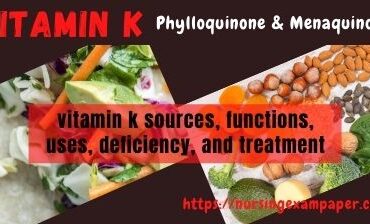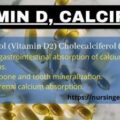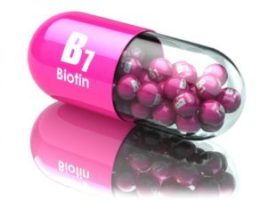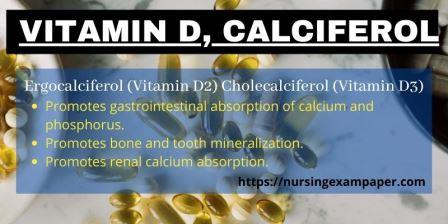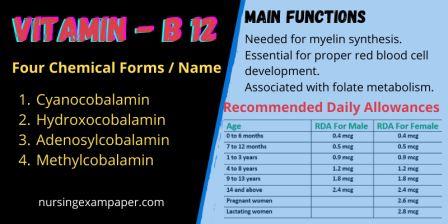In this article, I am going to tell you about the very important vitamins for our body. Read about Vitamin K which includes its introduction, types, uses, sources of Vitamin K, deficiency, and symptoms of deficiency. Why is this necessary? and its recommended daily allowance according to age.
Introduction
Vitamin K is a fat-soluble vitamin there are two types of Vitamin K. 1. Phylloquinone 2. Menaquinone.
- vitamin K1(phylloquinone)- it is the main type of vitamin K phylloquinone found in green leafy vegetables like Spanish, kale, and collard greens.
- vitamin K2(menaquinone)- This second type of vitamin K is menaquinone. Which is found in animal foods and fermented foods. And it is also produced by bacteria in our body.
Vitamin K helps in blood clotting. Because it helps in making essential proteins in the process of blood clotting. Prothrombin is a protein produced by vitamin K. and others. Osteocalcin is a protein that is needed in healthy bone tissue. It is also made of vitamin K which is found in the liver, brain, heart, pancreas, and bones. It rarely reaches a toxic level because it is quickly broken down and excreted in urine and feces.
Recommended Daily Allowance (RDA) of Vitamin K
| S. No. | Age Group | Recommended Amount |
|---|---|---|
| 1 | Newborn to 6 months | 2.0 mcg |
| 2 | 7 to 12 months | 2.5 mcg |
| 3 | 1 to 3 year | 30 mcg |
| 4 | 4 to 8 years | 55 mcg |
| 5 | 9 to 13 years | 60 mcg |
| 6 | 14 to 18 years | 75 mcg |
| 7 | 19 years to Adult (Man) | 120 mcg |
| 8 | 19 years to Adult (Woman) | 90 mcg |
| 9 | Pregenant & Breastfeeding | 90 mcg |
Source of Vitamin K
Plant-based sources- Green leafy vegetables like spinach, kale, collard greens, and turnip greens, broccoli, Brussels sprouts, cabbage, lettuce, soybean oil, and canola oil, blueberries, grapes. Phylloquinone is mainly found in these sources.
Animal-based sources- fermented soybeans, cheese, eggs, beef, pork, chicken, and fatty fish. Menaquinone is mainly found in these sources.
Vitamin B12 Source RDA Functions & Deficiency
Functions of Vitamin K
Vitamin K1 needed in the production of prothrombin is a protein that plays an important role in blood clotting bone health and heart health vitamin K is also needed in facilitating energy production in the mitochondria.
Vit K protects the cell membrane from damage due to Excess free radicals. so vitamin K plays the role of an antioxidant. vitamin K2 protects the risk of cardiovascular damage and improves heart health.
Vitamin K2 helps in the production of osteocalcin, a protein that binds calcium to bones. so vitamin K is necessary for bone health vitamin K decreases the risk of cancer anxiety and depression.
Deficiency of Vitamin K
vitamin K deficiency is commonly seen in infants who are breastfeeding vitamin K helps in blood clotting so that deficiency of Vitamin K can cause bleeding and building can be life-threatening in newborns.
Newborns do not get enough vitamin K before birth, and they cannot synthesize vitamin K. because their intestine has not acquired bacteria to produce vitamin K during the first few days.
Vitamin K deficiency also causes liver disorder and weakens the bone (Osteoporosis).
Vitamin D function, deficiency, sources, and dosage
Cause of Vit K Deficiency
- Lake intake of vitamin K in diet.
- A disorder that decreases vitamin K absorption. like cystic fibrosis.
- A very low-fat diet because of vitamin K absorbed with fat.
- The newborn small amount of vitamin K passes from the mother to the fetus during pregnancy.
- After birth newborns cannot synthesize vitamin K. Because their intestine has not acquired Bacteria to produce Vit. K.
Symptoms of Vitamin K Deficiency
Bleeding – into the skin, nose, wound in the stomach, intestine, vomiting with blood, and blood is seen in urine and stool.
Treatment
In newborns vitamin K injection.
For the deficiency of Vitamin K by mouth.
Read More –
